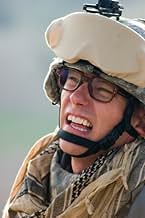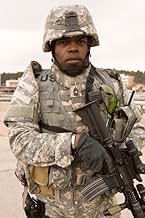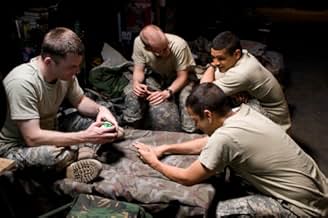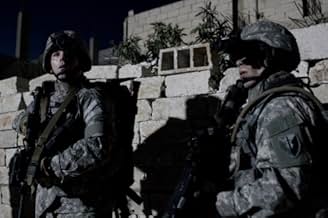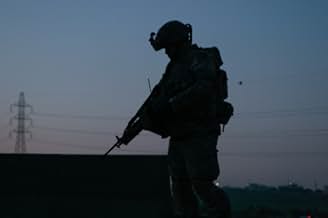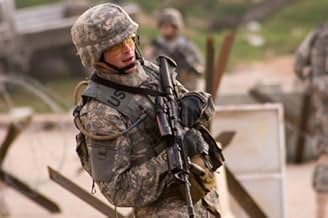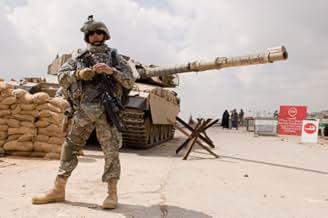NOTE IMDb
6,1/10
12 k
MA NOTE
La reconstitution dévastatrice du viol et du meurtre d'une jeune irakienne de 15 ans par des soldats américains à Samarra en 2006.La reconstitution dévastatrice du viol et du meurtre d'une jeune irakienne de 15 ans par des soldats américains à Samarra en 2006.La reconstitution dévastatrice du viol et du meurtre d'une jeune irakienne de 15 ans par des soldats américains à Samarra en 2006.
- Récompenses
- 6 victoires et 2 nominations au total
Anas Wellman
- Soldier
- (as Anas 'Tipsy' Wellman)
Happy Anderson
- Battalion Commander
- (as Eric 'Happy' Anderson)
- …
Avis à la une
Brian de Palma's Redacted ups the ante of protest films, fictionally recounting the rape and murder of a 14-year old Iraqi girl by U.S. soldiers in 2006. Using hand-held camera surveillance footage, Internet videos, excerpts from a French documentary and an Arab TV channel, Islamic fundamentalist websites, and the fictional camcorder diary of a young U.S. private, Redacted lets us know not only about the atrocities of war but about the unreliability of the way in which information is presented in the media and how we cannot trust what we see, even in his film.
Modeled after de Palma's earlier Casualties of War, Redacted searches for a truth in fiction that is deeper than reality-based documentary. Angel Salazar (Izzy Diaz) carries a video camera around shooting whatever he sees hoping to make a documentary that will be his ticket to film school. We are first introduced to his unit: Gabe Blix (Kel O'Neil), Lawyer McCoy (Rob Devaney), Sergeant Jim Sweet (Ty Jones) and good ol' boys, Reno Flake (Patrick Carroll) and B.B. Rush (Daniel Stewart Sherman). The videos make it apparent that our soldiers have lost their sense of purpose and are no longer on solid emotional ground.
The hand held video camera is then replaced by a French documentary about the soldier's routine at checkpoints in Samarra. Suddenly, a speeding car is approaching. Interpreting the signals by U.S. personnel to slow down as meaning they are being waved on through, the car is gunned down, killing a pregnant woman and her unborn child as the driver After a member of Salazar's unit is killed by a bomb, the two men who fired on the speeding car, Rush and Flake, invade the home of an Iraqi family in retribution and to enjoy the "spoils of war". In the middle of the night, they rape and murder a fourteen-year old girl, kill her family, and set the house on fire.
The sensitive Blix does not want to be involved with the mission, and McCoy goes along to try and prevent more harm but fails to stop the violence. Flake and Rush tell the rest of the company that any word of this incident will result in their death. The incident is seen only with a flickering light and the actual assault takes place off camera, but the scene nonetheless elicits a feeling of disgust. As if to try and show that the horrors of war are not limited to one side, de Palma shows the abduction and beheading of a U.S. soldier in very graphic terms. In the final gut wrenching sequence, a montage labeled "Collateral Damage" brings truth and fiction together as we see actual footage of Iraqi war victims mixed with staged deaths and faces that are redacted with black pens.
While Redacted is flawed by inconsistent acting and overly didactic add-ons, its impact is extremely powerful. De Palma indicts both the stupidity of the U.S. government for initiating the war, the complicity of the media in presenting us with a sanitized version of it, and a culture in which such atrocities are permitted to occur. Like the films of French director Bruno Dumont that show how meaningless violence generates more meaningless violence, the visceral impact of Redacted will stay with you for a long time. Slapping us in the face to show us how we have lost touch with the reality of war, the film is full of elemental passion, untidy, disjointed, and at times over-the-top, but in Dumont's words, it returns us "to the body, to the heart, to truth".
Modeled after de Palma's earlier Casualties of War, Redacted searches for a truth in fiction that is deeper than reality-based documentary. Angel Salazar (Izzy Diaz) carries a video camera around shooting whatever he sees hoping to make a documentary that will be his ticket to film school. We are first introduced to his unit: Gabe Blix (Kel O'Neil), Lawyer McCoy (Rob Devaney), Sergeant Jim Sweet (Ty Jones) and good ol' boys, Reno Flake (Patrick Carroll) and B.B. Rush (Daniel Stewart Sherman). The videos make it apparent that our soldiers have lost their sense of purpose and are no longer on solid emotional ground.
The hand held video camera is then replaced by a French documentary about the soldier's routine at checkpoints in Samarra. Suddenly, a speeding car is approaching. Interpreting the signals by U.S. personnel to slow down as meaning they are being waved on through, the car is gunned down, killing a pregnant woman and her unborn child as the driver After a member of Salazar's unit is killed by a bomb, the two men who fired on the speeding car, Rush and Flake, invade the home of an Iraqi family in retribution and to enjoy the "spoils of war". In the middle of the night, they rape and murder a fourteen-year old girl, kill her family, and set the house on fire.
The sensitive Blix does not want to be involved with the mission, and McCoy goes along to try and prevent more harm but fails to stop the violence. Flake and Rush tell the rest of the company that any word of this incident will result in their death. The incident is seen only with a flickering light and the actual assault takes place off camera, but the scene nonetheless elicits a feeling of disgust. As if to try and show that the horrors of war are not limited to one side, de Palma shows the abduction and beheading of a U.S. soldier in very graphic terms. In the final gut wrenching sequence, a montage labeled "Collateral Damage" brings truth and fiction together as we see actual footage of Iraqi war victims mixed with staged deaths and faces that are redacted with black pens.
While Redacted is flawed by inconsistent acting and overly didactic add-ons, its impact is extremely powerful. De Palma indicts both the stupidity of the U.S. government for initiating the war, the complicity of the media in presenting us with a sanitized version of it, and a culture in which such atrocities are permitted to occur. Like the films of French director Bruno Dumont that show how meaningless violence generates more meaningless violence, the visceral impact of Redacted will stay with you for a long time. Slapping us in the face to show us how we have lost touch with the reality of war, the film is full of elemental passion, untidy, disjointed, and at times over-the-top, but in Dumont's words, it returns us "to the body, to the heart, to truth".
The legendary words of Marshall MacLoughan, "The media IS the message", couldn't be further seen played out as in Redacted, Brian De Palma's latest film which ventures the director back into his experimental early days as a filmmaker in New York city. In his film, the media is the message, but only in part- it's about how media is used, or how subjective perceptions are taken into account, for coverage of a conflict which ironically enough has not had the kind of coverage seen in America as in the local Iraq and European media. But what stays true to De Palma as an auteur is the idea of voyeurism, or the watchers and the audience as the ones who continue to watch, and like Godard with his video experiments, Redacted is about its subject but it's also about process.
Like Blair Witch Project, we're seeing things "as-they-happen" by the view-point of a camera that a soldier, Angel, is carrying and using as an in to get into film school someday. This might be enough for a film covering a horrible tragic turn of events like depicted in Redacted, where two soldiers rape a teenager and kill and burn her and her baby sister. But De Palma's story, based on real events which were "fictionalized" up to a point only for legal reasons, indicts the whole process of viewing things through the filter of the lens. Of course there are moments when the characters realize that they're on video, and suddenly they either get irate and continue acting as themselves, or they start to posture for the camera. Instead of the carefully plotted and directed shots of films like Dressed to Kill or Carlito's Way (or, for that matter, the similar-in-premise Casualties of War) we get the messiness of raw camera-work from the soldier, the embedded journalists, the news media covering the story, web-casts obviously out of you-tube, and as the one "official" kind of film-making a French documentary crew doing a film on the group of soldiers covering the checkpoint.
It's suffice to say that this technique is almost a comment on itself, and it's one of the curious ideas behind the experiment of Redacted that makes it interesting. We know that when a security camera or when Angel's camera put on a seat meant to be shut off captures objectively what's going on- like the "what happens in Vegas stays in Vegas" scene or the plot to go after the family. But there's an inverse to this as well since De Palma is filming this with a script and with actors (who arguably are good at being naturalistic two-dimensional soldiers), since there is a stylization, yet without calling attention to the self-consciousness the audience feels during this. And meanwhile, De Palma makes his anti-war film gripping in the unexpected places; a hard-ass sergeant who gets blown up without any warning at all; the death of one of the soldiers as revenge from a terrorist group; the scene with Flake and Rush where they take the camera themselves and (as proof beyond a doubt that war and repeated tours of duty have made them bat-s***) defend themselves while attempting to praise a fallen brother while one wears a duck hat.
One almost hopes the experiment would work even better as one of the director's best, which ultimately it isn't. Certain tactics, like making evident the pretentiousness of the French documentary by having Barry Lyndon orchestrations playing over, or the girl on the fake you-tube site blasting the soldiers, just don't work at all. And a few of the performances could use some tweaking. But Redacted, I think, has some bad rap attached to it. It's not simply about the obvious, which is that war is hell and brings out the absolute worst out of human beings who have no control over themselves once pushed beyond reason. It's also about the means of viewing something of the ultimate routine nightmare like a checkpoint, or the rape of the girl (so much that Angel can't even watch as the "fly on the wall"), or a questioning, that makes it a significant effort. De Palma distinguishes his film, for better or worse, by adding the connotation of what it means to watch, or what it means to get on record, or what it does to break the 'fourth wall' while questioning it during it. It has the same free-form ambition of De Palma's best experimental work- Hi, Mom!- if not much a great film in the end.
One thing's for sure- it's in a rightful place playing only in one theater in New York city; it's the kind of work that is hard to market beyond playing as an experimental piece. Ironically, as of late, it's been attacked by Bill O'Reilly WHILE it's being advertised during the show! Talk about counter-programming for an audience that, for the most part, until it's out on DVD, won't have a lick of what the picture really entails. Message?
Like Blair Witch Project, we're seeing things "as-they-happen" by the view-point of a camera that a soldier, Angel, is carrying and using as an in to get into film school someday. This might be enough for a film covering a horrible tragic turn of events like depicted in Redacted, where two soldiers rape a teenager and kill and burn her and her baby sister. But De Palma's story, based on real events which were "fictionalized" up to a point only for legal reasons, indicts the whole process of viewing things through the filter of the lens. Of course there are moments when the characters realize that they're on video, and suddenly they either get irate and continue acting as themselves, or they start to posture for the camera. Instead of the carefully plotted and directed shots of films like Dressed to Kill or Carlito's Way (or, for that matter, the similar-in-premise Casualties of War) we get the messiness of raw camera-work from the soldier, the embedded journalists, the news media covering the story, web-casts obviously out of you-tube, and as the one "official" kind of film-making a French documentary crew doing a film on the group of soldiers covering the checkpoint.
It's suffice to say that this technique is almost a comment on itself, and it's one of the curious ideas behind the experiment of Redacted that makes it interesting. We know that when a security camera or when Angel's camera put on a seat meant to be shut off captures objectively what's going on- like the "what happens in Vegas stays in Vegas" scene or the plot to go after the family. But there's an inverse to this as well since De Palma is filming this with a script and with actors (who arguably are good at being naturalistic two-dimensional soldiers), since there is a stylization, yet without calling attention to the self-consciousness the audience feels during this. And meanwhile, De Palma makes his anti-war film gripping in the unexpected places; a hard-ass sergeant who gets blown up without any warning at all; the death of one of the soldiers as revenge from a terrorist group; the scene with Flake and Rush where they take the camera themselves and (as proof beyond a doubt that war and repeated tours of duty have made them bat-s***) defend themselves while attempting to praise a fallen brother while one wears a duck hat.
One almost hopes the experiment would work even better as one of the director's best, which ultimately it isn't. Certain tactics, like making evident the pretentiousness of the French documentary by having Barry Lyndon orchestrations playing over, or the girl on the fake you-tube site blasting the soldiers, just don't work at all. And a few of the performances could use some tweaking. But Redacted, I think, has some bad rap attached to it. It's not simply about the obvious, which is that war is hell and brings out the absolute worst out of human beings who have no control over themselves once pushed beyond reason. It's also about the means of viewing something of the ultimate routine nightmare like a checkpoint, or the rape of the girl (so much that Angel can't even watch as the "fly on the wall"), or a questioning, that makes it a significant effort. De Palma distinguishes his film, for better or worse, by adding the connotation of what it means to watch, or what it means to get on record, or what it does to break the 'fourth wall' while questioning it during it. It has the same free-form ambition of De Palma's best experimental work- Hi, Mom!- if not much a great film in the end.
One thing's for sure- it's in a rightful place playing only in one theater in New York city; it's the kind of work that is hard to market beyond playing as an experimental piece. Ironically, as of late, it's been attacked by Bill O'Reilly WHILE it's being advertised during the show! Talk about counter-programming for an audience that, for the most part, until it's out on DVD, won't have a lick of what the picture really entails. Message?
"Redacted" is a shattering, powerful experience. It has been criticized by some as painful to watch...but I think that is the point entirely.
For too long, Americans have been spoon-fed a steady diet of lies about the Iraq War (not least about why we invaded that nation in the first place).
De Palma aims to shows us another side to this terrible conflict; one that we won't get on Fox News (or any of the other corporate propaganda networks). It's about time Americans got another point of view on Iraq, because we're hopelessly misinformed about what's going on there (an astonishing number of Americans including a majority of Fox News viewers STILL believe to this day that Saddam was behind 9/11). My friends in Europe don't believe me when I tell them this.
Incidentally, I don't think a film has to be pleasant to watch to be a memorable cinema experience. For example, Fassbinder never made a "entertaining" film, and yet his movies are among the most powerful in all of cinema.
The Iraq War is a horror story of untold magnitude. This film aims to capture the nightmare of the ever-shifting, chaotic Iraq battlefield. It's a film that will be hated, in knee-jerk fashion, by the Bush worshiping nut-case right-wing fringe. But for the rest of us, it's a must-see, powerful and brave film.
For too long, Americans have been spoon-fed a steady diet of lies about the Iraq War (not least about why we invaded that nation in the first place).
De Palma aims to shows us another side to this terrible conflict; one that we won't get on Fox News (or any of the other corporate propaganda networks). It's about time Americans got another point of view on Iraq, because we're hopelessly misinformed about what's going on there (an astonishing number of Americans including a majority of Fox News viewers STILL believe to this day that Saddam was behind 9/11). My friends in Europe don't believe me when I tell them this.
Incidentally, I don't think a film has to be pleasant to watch to be a memorable cinema experience. For example, Fassbinder never made a "entertaining" film, and yet his movies are among the most powerful in all of cinema.
The Iraq War is a horror story of untold magnitude. This film aims to capture the nightmare of the ever-shifting, chaotic Iraq battlefield. It's a film that will be hated, in knee-jerk fashion, by the Bush worshiping nut-case right-wing fringe. But for the rest of us, it's a must-see, powerful and brave film.
I would give this movie 10 stars for the courage that the producers had shown to reveal the truth about was going on there in Iraq.
First of all I am an Iraqi who witnessed everything that happened since the first moment the war took place. I am not an American who is in favour of certain political wing or party. And it is really frustrating to hear those voices picking holes in De Palma's movie and accusing him of being biased or not knowing how the army operates or..or ..or ..etc. You don't need to know anything to be human!! and to stop killing, supporting, or covering for the killing of the innocents.
It is not about elections and politics!! it is about hundreds of people getting killed daily by different groups whether Al-Qaeda, the militias, death squads, or the coalition forces themselves!! The movie was so touching in every single aspect for an Iraqi who had lived there and witnessed the war. The combination of bad and good soldiers is so true. And choosing Sammara rather than any other province or city was so wise since the pressure and threat that the soldiers are under there is not the same for soldiers who are in rather safer areas like the Northern part of Iraq. Also the psychological pressure that most of those soldiers are under has been made clear in this movie; as well as, the negativity, hostility and racism of some soldiers..If you are an Iraqi who understands English, you can understand what the American soldiers mumble or yell about every time an Iraqi approaches them. You can tell from the look whether that soldier is a good or a bad one. Something that has been successfully shown and well presented in that movie.
Like most of the people who support the American army there and consider every Iraqi or Muslim a terrorist or "desert nig**r" or "rag head", most of the Iraqis and Muslims consider every troop a thief, raper, and occupier who is after money, oil and damaging or destroying Islam. But does that mean that they are right? they are both wrong!! All the movie did is that it put the reality of what is going on in Iraq in to cinema cause not all people follow the news or know which media to be trusted; moreover, it didn't say that those stories or characters are true or ever existed. And you don't need De Palma or the Fox news to tell you that!! May be it is true that they might not know a lot about Iraq, but what makes you think that you know better than them about Iraq??!!..
Another true and clever thing about the movie were the videos posted on the internet whether for the insurgents, soldiers' wives, or the people who oppose such disgraceful crimes. Also how, in the end, the innocent soldiers were the ones who pay for the crimes that their teammates commit whether physically (Salazar) or psychologically (McCoy).
First of all I am an Iraqi who witnessed everything that happened since the first moment the war took place. I am not an American who is in favour of certain political wing or party. And it is really frustrating to hear those voices picking holes in De Palma's movie and accusing him of being biased or not knowing how the army operates or..or ..or ..etc. You don't need to know anything to be human!! and to stop killing, supporting, or covering for the killing of the innocents.
It is not about elections and politics!! it is about hundreds of people getting killed daily by different groups whether Al-Qaeda, the militias, death squads, or the coalition forces themselves!! The movie was so touching in every single aspect for an Iraqi who had lived there and witnessed the war. The combination of bad and good soldiers is so true. And choosing Sammara rather than any other province or city was so wise since the pressure and threat that the soldiers are under there is not the same for soldiers who are in rather safer areas like the Northern part of Iraq. Also the psychological pressure that most of those soldiers are under has been made clear in this movie; as well as, the negativity, hostility and racism of some soldiers..If you are an Iraqi who understands English, you can understand what the American soldiers mumble or yell about every time an Iraqi approaches them. You can tell from the look whether that soldier is a good or a bad one. Something that has been successfully shown and well presented in that movie.
Like most of the people who support the American army there and consider every Iraqi or Muslim a terrorist or "desert nig**r" or "rag head", most of the Iraqis and Muslims consider every troop a thief, raper, and occupier who is after money, oil and damaging or destroying Islam. But does that mean that they are right? they are both wrong!! All the movie did is that it put the reality of what is going on in Iraq in to cinema cause not all people follow the news or know which media to be trusted; moreover, it didn't say that those stories or characters are true or ever existed. And you don't need De Palma or the Fox news to tell you that!! May be it is true that they might not know a lot about Iraq, but what makes you think that you know better than them about Iraq??!!..
Another true and clever thing about the movie were the videos posted on the internet whether for the insurgents, soldiers' wives, or the people who oppose such disgraceful crimes. Also how, in the end, the innocent soldiers were the ones who pay for the crimes that their teammates commit whether physically (Salazar) or psychologically (McCoy).
Using video-diaries, YouTube postings, news reports and other footage, this film tells the story of one unit of US marines serving in Samarra. The heat is intense, the hours are long, the work is dull and the monotony is only broken by the occasion attack or defence of the check-points. When one of the unit is killed by an improvised explosive device, tensions are further increased and the night raids intensify to pick up suspects. However, for a couple of individuals the need for both revenge and release is almost too much to bear.
Reading the reviews on this title from IMDb users it is clear that too many people are bringing their politics to the film and some have seen the issues not the piece of work itself. So we have 10* reviews saying that "Americans don't like their own dirty laundry" and 1* reviews labelling it a "disgrace" and practically aligning De Palma with the 11th September terrorists. This does happen with such films but it is of no use to me even if my politics suggested that I should love this more than hate it. The truth is that my politics never came into it because what I was confronted with was a good idea, a topical issue, has good moments but mostly it is unconvincing and obvious in its structure and delivery.
As an idea, the brutal or callous actions of a minority of Allied forces in Iraq is an important subject and one worthy of an intelligent and impacting presentation. Likewise the use in this war of many, many different types of media that allow us to "see" the war for ourselves which is perhaps a mixed blessing is an interesting way to deliver a story. However the film doesn't manage to pull it all together in a consistent and convincing manner. It has its moments of course; the central atrocity is a shocking and difficult scene for what you don't see more than what you do but otherwise the scenes and characters don't flow together in the way that that one scene engages and convinces. I can understand why some of it felt stilted and strange because ultimately vlogs etc do feel a bit cheesy and corny at times but to me this just meant that the characters had to be extra strong so that they could stand up to the media. Sadly though they are too obvious and simple, almost to the point of cliché and they make it all feel too simplistic too easy to dismiss as biased and angry.
The dialogue doesn't help this either since it is often clumsy as it attempts to make a point or a bit too "acted" when it is supposed to be natural and jocular. De Palma's use of the various media doesn't work anywhere near as well as I thought it could; the documentary with its overuse of classical music drags on and is a poor copy of some of the music used in the film Afghansti (which is so similar that it must have been but the latter uses it sparingly and surrounds it with substance). The central vlog stumbles due to the acting and material being presented that way. It is not really the cast's fault since they are mostly unknowns and perhaps not given the best tools to show what they can do but it does mean the film is mostly reasonably poor. De Palma does deserve credit for taking on a challenging and topical project where he could just continue to rest of his laurels and take easy projects for money, but this does not buy him a free pass because good intentions are not anything unless they are followed through on the ground.
Redacted is just that a good plan on paper but the execution is lacking across the board, taking away from even the plan itself. Those looking to feel the film's anger and outrage will probably get more from it than the casual viewer but just because a film works when playing to the choir doesn't mean it is good. Sadly for the casual viewer I suspect it will come over as too obvious, preachy and half-done to really impress.
Reading the reviews on this title from IMDb users it is clear that too many people are bringing their politics to the film and some have seen the issues not the piece of work itself. So we have 10* reviews saying that "Americans don't like their own dirty laundry" and 1* reviews labelling it a "disgrace" and practically aligning De Palma with the 11th September terrorists. This does happen with such films but it is of no use to me even if my politics suggested that I should love this more than hate it. The truth is that my politics never came into it because what I was confronted with was a good idea, a topical issue, has good moments but mostly it is unconvincing and obvious in its structure and delivery.
As an idea, the brutal or callous actions of a minority of Allied forces in Iraq is an important subject and one worthy of an intelligent and impacting presentation. Likewise the use in this war of many, many different types of media that allow us to "see" the war for ourselves which is perhaps a mixed blessing is an interesting way to deliver a story. However the film doesn't manage to pull it all together in a consistent and convincing manner. It has its moments of course; the central atrocity is a shocking and difficult scene for what you don't see more than what you do but otherwise the scenes and characters don't flow together in the way that that one scene engages and convinces. I can understand why some of it felt stilted and strange because ultimately vlogs etc do feel a bit cheesy and corny at times but to me this just meant that the characters had to be extra strong so that they could stand up to the media. Sadly though they are too obvious and simple, almost to the point of cliché and they make it all feel too simplistic too easy to dismiss as biased and angry.
The dialogue doesn't help this either since it is often clumsy as it attempts to make a point or a bit too "acted" when it is supposed to be natural and jocular. De Palma's use of the various media doesn't work anywhere near as well as I thought it could; the documentary with its overuse of classical music drags on and is a poor copy of some of the music used in the film Afghansti (which is so similar that it must have been but the latter uses it sparingly and surrounds it with substance). The central vlog stumbles due to the acting and material being presented that way. It is not really the cast's fault since they are mostly unknowns and perhaps not given the best tools to show what they can do but it does mean the film is mostly reasonably poor. De Palma does deserve credit for taking on a challenging and topical project where he could just continue to rest of his laurels and take easy projects for money, but this does not buy him a free pass because good intentions are not anything unless they are followed through on the ground.
Redacted is just that a good plan on paper but the execution is lacking across the board, taking away from even the plan itself. Those looking to feel the film's anger and outrage will probably get more from it than the casual viewer but just because a film works when playing to the choir doesn't mean it is good. Sadly for the casual viewer I suspect it will come over as too obvious, preachy and half-done to really impress.
Le saviez-vous
- AnecdotesThe scene where Salazar is smiling as he films a scorpion being devoured by ants is an homage to the beginning of Sam Peckinpah's The Wild Bunch (1969) where a group of children gleefully watch scorpions being eaten by ants .
- GaffesIn one scene, PFC Reno Flake refers to SPC Lawyer McCoy as a "Corporal" when in fact his rank is that of Specialist.
Meilleurs choix
Connectez-vous pour évaluer et suivre la liste de favoris afin de recevoir des recommandations personnalisées
- How long is Redacted?Alimenté par Alexa
Détails
- Date de sortie
- Pays d’origine
- Sites officiels
- Langues
- Aussi connu sous le nom de
- Örtülü gerçek
- Lieux de tournage
- Sociétés de production
- Voir plus de crédits d'entreprise sur IMDbPro
Box-office
- Budget
- 5 000 000 $US (estimé)
- Montant brut aux États-Unis et au Canada
- 65 388 $US
- Week-end de sortie aux États-Unis et au Canada
- 25 628 $US
- 18 nov. 2007
- Montant brut mondial
- 784 604 $US
- Durée
- 1h 30min(90 min)
- Couleur
- Mixage
- Rapport de forme
- 1.85 : 1
Contribuer à cette page
Suggérer une modification ou ajouter du contenu manquant


